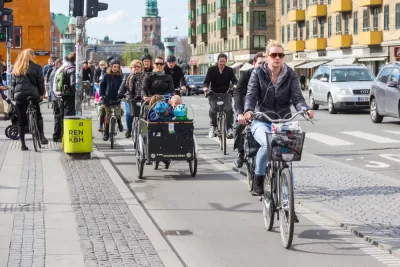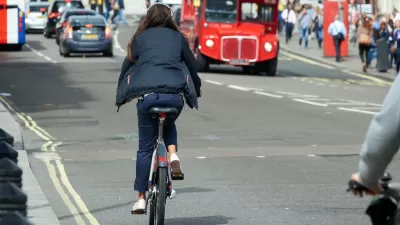Copenhagen's positive attributes are clear, but how transferable are they?

For years, American urbanists have visited Copenhagen and returned with what Macho Man Randy Savage once called "jealous eyes." The city’s thriving active transit community, density and overall civility are legendary. Martin C. Pedersen writes in Common Edge that there's good reason for the city's success: "It’s the product of a shared belief that transcends urban design, even though the city is a veritable laboratory for pretty much all of the best practices in the field."
While fewer than one percent of Americans bike to work, "Half of its residents commute to work on bikes (snow or shine), a large number even for Europe," Pedersen writes. Bike safety is taught to Copenhagen residents up through high school.
While American cities must move toward some of Copenhagen’s accomplishments to become more sustainable and equitable, Pedersen is realistic about how difficult it would be to "transfer" the city's success. One issue is that, as a city of 600,000, Copenhagen's challenges differ from a larger city's challenges. For instance, the city is getting richer and is, consequently, struggling to make room for lower income families. Tensions also simmer around the topic of immigrants. To export the city's strengths without its weaknesses is a tricky task.
FULL STORY: What We Can and Can't Learn from Copenhagen

Alabama: Trump Terminates Settlements for Black Communities Harmed By Raw Sewage
Trump deemed the landmark civil rights agreement “illegal DEI and environmental justice policy.”

Planetizen Federal Action Tracker
A weekly monitor of how Trump’s orders and actions are impacting planners and planning in America.

The 120 Year Old Tiny Home Villages That Sheltered San Francisco’s Earthquake Refugees
More than a century ago, San Francisco mobilized to house thousands of residents displaced by the 1906 earthquake. Could their strategy offer a model for the present?

In Both Crashes and Crime, Public Transportation is Far Safer than Driving
Contrary to popular assumptions, public transportation has far lower crash and crime rates than automobile travel. For safer communities, improve and encourage transit travel.

Report: Zoning Reforms Should Complement Nashville’s Ambitious Transit Plan
Without reform, restrictive zoning codes will limit the impact of the city’s planned transit expansion and could exclude some of the residents who depend on transit the most.

Judge Orders Release of Frozen IRA, IIJA Funding
The decision is a victory for environmental groups who charged that freezing funds for critical infrastructure and disaster response programs caused “real and irreparable harm” to communities.
Urban Design for Planners 1: Software Tools
This six-course series explores essential urban design concepts using open source software and equips planners with the tools they need to participate fully in the urban design process.
Planning for Universal Design
Learn the tools for implementing Universal Design in planning regulations.
Clanton & Associates, Inc.
Jessamine County Fiscal Court
Institute for Housing and Urban Development Studies (IHS)
City of Grandview
Harvard GSD Executive Education
Toledo-Lucas County Plan Commissions
Salt Lake City
NYU Wagner Graduate School of Public Service




























